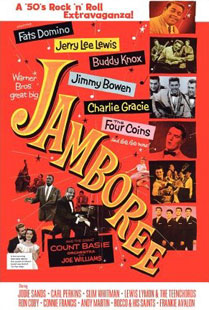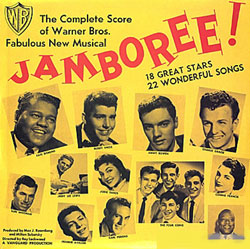 The "plot," such as it is, for Jamboree! (1957), which doesn't invariably have the exclamation point, & which was shown in England as Disc Jockey Jamboree, is sufficient to help string together many musical numbers.
The "plot," such as it is, for Jamboree! (1957), which doesn't invariably have the exclamation point, & which was shown in England as Disc Jockey Jamboree, is sufficient to help string together many musical numbers.
The film's trailer banners "The disc jockeys picked the stars. The disc jockey's picked the tunes." This wasn't true but scads of disc jockeys from the US. Canada, London, and Berlin got cameos introducing acts.
Only a couple of these DJs are discussed in the following overview, as I've elected to focus on the acts. But a whole 'nother essay could be gotten by discussing the interesting regional histories of these radio personalities.
Making disc jockeys part of the film was awfully clever for promotional purposes, as it was bound to insure the film got plenty of free radio advertising when released in the major cities.
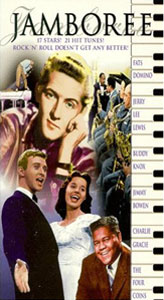 Some of the songs, as sung by the lead characters Pete & Honey (Paul Carr & Freda Holloway), really are part of the film & its story. But the many guest appearances of musical acts of the 1950s were filmed on soundstages to be spliced into the movie, sometimes awkwardly. Some of the songs, as sung by the lead characters Pete & Honey (Paul Carr & Freda Holloway), really are part of the film & its story. But the many guest appearances of musical acts of the 1950s were filmed on soundstages to be spliced into the movie, sometimes awkwardly.
Those individual numbers are like the soundies of the 1940s, stand-alone filmed performances, and the film with its story neither contributes nor much distracts from the inherent and relative values of the many musical short-shorts sewn into the movie.
It's those independent sequences that make Jamboree the great thing that it is. But the story is serviceable and doesn't take up too much time.
In essence two rival managers -- Lew who manages Honey Wynn, and Grace who manages Pete Porter -- had formerly been man & wife. They decide to put their two acts together as a romantic duet.
They think of their joined acts as the new Jeanette MacDonald and Nelson Eddy, which reflects their crusty generation. The film strangely perceives them as the stars of the movie, as Kay Medford as Grace & Bob Pastine as Lew get top cast billing & way too much screen time.
As rivals these managers or agents can't help trying to one-up one another, which doesn't serve the duet of Honey & Pete very well. Both want to launch their respective client into solo careers for their own egos, not for the young singers' benefit. Sabotaging the act, as well as the budding romance between Pete & Honey, will have to work itself out to everyone's benefit by the end.
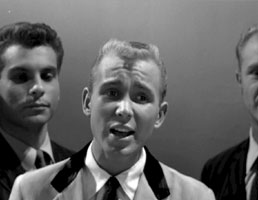 Developing this story doesn't require a lot of time, so the bulk of the film is the musical short-shorts. The first one opens the film, a number called "Record Hop Tonight." Developing this story doesn't require a lot of time, so the bulk of the film is the musical short-shorts. The first one opens the film, a number called "Record Hop Tonight."
A poster outside the theater tells us we are seeing "Ernest Bragin in Cool Cats, a New Revue," though the actual singer is Andy Martin. Everyone but "Pete & Honey" are billed as themselves, & while Andy Martin isn't is a mite odd.
Jitterbuggers are on a stage with a giant record-player to dance around. Andy the lead vocalist is assisted by four harmonizers. They are all rather dorky to tell the truth, creating a prep-school take on a beatnik sound.
"Record Hop Tonight" was released as a single from Chancellor Records in Philadelphia, as the a-side with "Sweetie Pie" on the reverse. It seems to have constituted the height of Andy's non-career. These were days of payola & no doubt a little extra funds were slipped to the production to put the singer right out in front as the film's first act, as though he qualified for the position.
Andy apparently hoped for an acting career which didn't go much better. He's an extra in an episode of the '50s television series The Rifleman. But his only real lingering achievement is performing "Record Hop Tonight" in Jamboree. It does successfully set a mood of the film as commercial pop, & when some of the acts to come turn out to be a hell of a lot better, it's nice to find bits exceeding rather than deflating expectation.
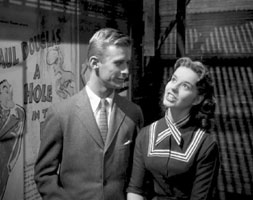 Honey Wynn's first number is set in dark film noir alley with slightly seedy roadshow posters on the wall, & a homeless drunk tipping his hat before Honey sings "For Children of All Ages" to Pete, in the voice of Connie Francis.
Honey Wynn's first number is set in dark film noir alley with slightly seedy roadshow posters on the wall, & a homeless drunk tipping his hat before Honey sings "For Children of All Ages" to Pete, in the voice of Connie Francis.
The sentimental ballad comes off pretty damned well, considering the enormity of the talent of who is really singing it:
"Build your dream/ For it's not as late as it may seem/ Dreams are made for children of all ages/ Touch a star/ And it doesn't matter who you are/ Dreams are made for children of all ages.
"When ever you are feeling blue just start pretending/ If you believe in make believe you'll find a happy ending./ You can do/ All the things that you have longed to do/ Dreams come true for children of all ages."
Honey had had an earlier aborted scene in which she was trying out for a musical stage role. She sang "Every night at midnight I awaken/ Oh my darling how my heart is achin'." But she's not allowed to sing more, failing to get the role, though her manager Lew has faith in her. That's when she's introduced to Pete Porter, whose manager calls him "the new Sinatra," though as yet he hasn't performed anywhere.
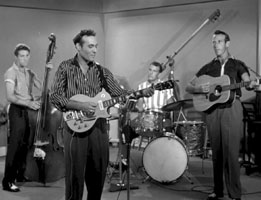 When the self-serving back-stabbing managers decide to put their two beginner-acts together into a romantic pop-act, they get a song written just for them & score some cheap studio time by horning in on the "leftover" part of Carl Perkin's recording time.
When the self-serving back-stabbing managers decide to put their two beginner-acts together into a romantic pop-act, they get a song written just for them & score some cheap studio time by horning in on the "leftover" part of Carl Perkin's recording time.
The songwriter is played by Aaron Schroder in a cameo performance. He really was a composer who wrote "A Big Hunk o' Love," "I Was the One," "Stuck on You," & "it's Now or Never" among others for Elvis. But he didn't write anything for this film.
It amusingly unconvincing that Pete & Honey are in the same building with Carl Perkins. Dialogue is written like in a jungle movie, "Look over there!" cut to lion a thousand miles away on some veldt, then back to the great white hunter in a tropical forest made up of potted plants, aiming his rifle.
Carl Perkins does the rockabilly number "I'm Glad All Over" with his small combo. Carl has working class charisma, but his heart wasn't in this song, & it never charted as a hit. It goes in part:
"Ain't no doubt about it, this must be love/ On little kiss from you & I'm glad all over/ Ooo, baby, hot-dang-dilly/ It's so silly but I'm glad all over...." It's no wonder Carl wasn't satisfied with lyrics like those, but he manages to sell the song even so. It's pretty good minor Perkins, even with his sidemen being a mite zombified.
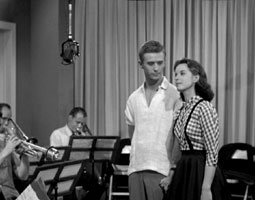 Carl's mini-film is too soon over & then we cut back to the story with everyone pretending Carl had just been left without passing anyone. Carl's mini-film is too soon over & then we cut back to the story with everyone pretending Carl had just been left without passing anyone.
Then out comes Honey & Pete to record their own wussy song, "Who Are We To Say." It's almost a jazz number reaching for pop, but as performed, it's a love song for tweens.
Again actress Holloway is really lipsyncing the voice of Connie Francis. So as banal little ballads go, it's quite good. Paul Carr as Pete, though also an actor foremost, surprisingly enough was able to sing his own role.
"Who Are We to Say" and his solo later in the film "If Not For You" were even released as a single, but alas Carr's duet side is not with Connie Francis on the record. In all likelihood Connie's recording contract elsewhere prohibited the release, so her part on vinyl is by Fran Lori.
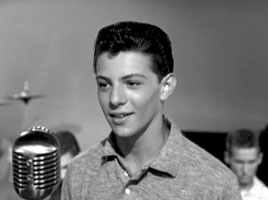 Pete & Honey develop a successful career with romantic duets. But Lew has convinced Honey to secretly cut a solo single, keeping it a secret from Pete. But first, it's time to do a cut-away to Frankie Avalon in the same recording studio Carl Perkins was filmed in.
Pete & Honey develop a successful career with romantic duets. But Lew has convinced Honey to secretly cut a solo single, keeping it a secret from Pete. But first, it's time to do a cut-away to Frankie Avalon in the same recording studio Carl Perkins was filmed in.
"Teacher's Pet" is the number for another mini-film barely integrated into the whole. Frankie's backed by a combo & a harmony group, Rocco & His Saints, who are on a few of Avalon's early recordings, including "Cupid" the flipside of "Teacher's Pet" in its single release from Chancellor Records.
Quite a few of the acts featured in Jamboree are from Phily, & the film in part a grand reflection of the music scene in the City of Brotherly Love during the birth of rock & roll.
Rocco & His Saints were a Philadelphia group & originally Frankie Avalon had been Rocco's trumpet player! Frankie upstaged the group entirely, & they were lucky to be included in the film, which pretty much marked the height of their existence, though one other member of the Saints got himself a solo career, Bobby Rydell.
The Saints do manage to provide a little bit of depth for what is commercial junk for the least discerning kids. Singers like Frankie Avalon or Fabian Forte or Pat Boone could easily have been the death of rock 'n' roll if they'd really succeeded in squeezing out the originators (mostly African American) with their whitebread simpering.
Yet Frankie was a beauty without doubt & kind of pathetically cute shaking his legs like he thinks he's Elvis. But a song about doing homework with a subtext perhaps intentionally about a sexually harrassing schoolteacher, well, it's more creepy than sexy.
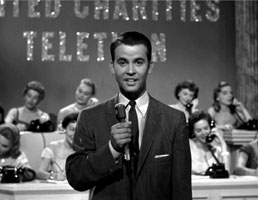 Frankie clears out of the recording studio never interacting with the cast which he of course never met. Then into the studio comes Honey for to cut her solo act single "Siempre," which is "Always" in Spanish:
Frankie clears out of the recording studio never interacting with the cast which he of course never met. Then into the studio comes Honey for to cut her solo act single "Siempre," which is "Always" in Spanish:
"Take me in your arms my love/ Why must we stay so far apart/ To you I give my heart/ Not only for tonight, siempre..." The fogyish composition is not that good, but again the voice of Connie Francis sells it.
Dick Clark appears in the film as the emcee of a national telethon raising money for "a dreaded disease" not otherwise specified.
He'd being doing Bandstand, later called American Bandstand, for several years, though his actual show is not mentioned. Several of the acts in Jamboree had also appeared on Bandstand & Dick may well have been instrumental in bringing on board the regional disc jockeys who're about to enter the picture.
He starts the ball rolling as the "story" goes from state to state & eventually from country to country, meeting top disc jockeys around the world who introduce each act performing for the telethon. It's fascinating to see who the top disc jockeys really were at the time, many involved in the payola scandal.
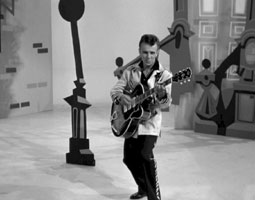 Ed Bonner of KXOK St. Louis introduces Charlie Gracie "to sing he newest release, 'Cool Baby.'"
Ed Bonner of KXOK St. Louis introduces Charlie Gracie "to sing he newest release, 'Cool Baby.'"
Bonner had been a regional teen idol in his own right, in days when radio dramas & comedies were making their transition to television & disc jockeys were replacing shows like The Life of Riley or The Great Gildersleeves.
We cut from the DJ to a stage with a wounderful '50s beatnik set, for another of those stand-alone musical shorts. With a greaser haircut & a guitar, Charlie Gracie sings the Otis "Dont Be Cruel" Blackwell composition:
"I want to hold you, mmm-hmmm,/ I'll never scold you, mmm-hmmmm/ Please don't cry-i-hi/ Well I won't lie-i-hi/ You're really my-i-hi/ Cool baby..."
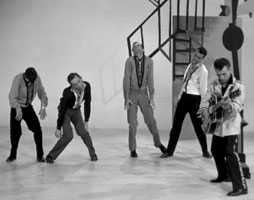 After the first verse, a group of harmonizing dancing dudes slink out on stage and take bizarre physical postures, increasing the sense of a beatnik club. It's artfully hip visually whether or not you like the song. After the first verse, a group of harmonizing dancing dudes slink out on stage and take bizarre physical postures, increasing the sense of a beatnik club. It's artfully hip visually whether or not you like the song.
Though he's not very well remembered, Charlie was a pretty big star in his day, with one giant hit, "Butterfly," & several minor hits. The last time I checked, he was still performing nostalgia rock.
Like a lot of the acts in this film, he started out in Philadelphia. At his height he was promoted on American Bandstand, did Alan Freed rock concerts, & got on the Ed Sullivan Show same as Elvis.
He was the second American rocker (after Bill Haley) to show the "guitar hero" image at the London Palladium, so one of the first big influences in supplanting the saxophone as the standard rock instrument with the electric guitar.
He was widely heralded as the next best thing to Bill Haley & the Comets, which is also probably why he's not better remembered today. Still, if you hear his pounding roots-rock "Butterfly" or his Elvis-impersonating "Fabulous," you'll never say he wasn't cool, baby.
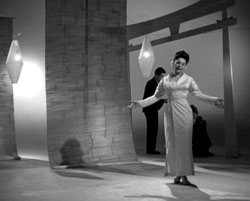 Next up is DJ Sandy Singer from WDGY Minneapolis-St Paul introduces "one of our favorite" singers, "a little girl called Jodie Sands." She's neither little nor a little girl, but kind of a crusty old singer a mite out of place ina youth-movie.
Next up is DJ Sandy Singer from WDGY Minneapolis-St Paul introduces "one of our favorite" singers, "a little girl called Jodie Sands." She's neither little nor a little girl, but kind of a crusty old singer a mite out of place ina youth-movie.
She sings "Sayonara" while dressed in a marginally oriental style. There's a wacky moment in the choreography when when someone walks through the set carrying a fish.
Jodie is filmed on a moody shadowy dimly lit set perhaps to hide her age. She should've sung her only hit song, "With All My Heart," though "Sayanara" probably pleased the parents who drove their pre-teen kids to the drive-in movie to see this film in 1957.
Jodie had more success when she toured Europe than she ever had in the US, but was not around long on either continent.
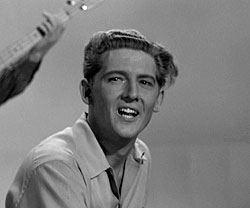 Denver's KIMN DJ Ray Perkins introduces "the Jerry Lee Lewis Trio," for a super classic boogie-piano rockabilly performance of "Great Balls of Fire," supported by J. W. Brown on electric bass, & Russ Smith on drums. Denver's KIMN DJ Ray Perkins introduces "the Jerry Lee Lewis Trio," for a super classic boogie-piano rockabilly performance of "Great Balls of Fire," supported by J. W. Brown on electric bass, & Russ Smith on drums.
Jerry Lee was often filmed singing this, unlike many of the film's acts who left only their one song for Jamboree to posterity.
But here Jerry is as a veritable kid, in his prime, handsome with his dishevelled hair. He's perhaps a little too subdued compared to most of his performances, but great, great, great.
All the numbers in Jamboree are lipsynced, as was normal at the time. They're not just lipsyncing their records, however, as these were brand new studio recordings just for the film, meaning even classics from Fats Domino or Jerry Lee Lewis are alternate versions, mostly with condensed arrangements that only run a minute & a half each.
Jerry Lee made a bit of a stink about that, & rightly so, as he hated the phoniness of lipsynching. This is probably why he seems subdueed; it's hard to get heatedly excited while only pretending to sing.
The only concession is the director let him perform the song live for the film crew. But no one had the vision, forsight, or technical skill to record it live. Jerry Lee would later speak disdainfully of the whole film, except his own minute & a half.
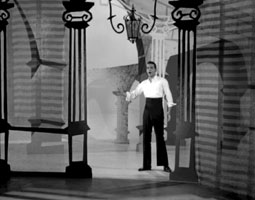 Jerry Meyers of CKOY Ottawa introduces "entertainment from south of the border," Ron Coby singing "Toreodor."
Jerry Meyers of CKOY Ottawa introduces "entertainment from south of the border," Ron Coby singing "Toreodor."
The soloist is actually Cauby Peixoto, but seems temporarily to have thought he'd have more appeal to gringos with a non-Latino name. With an expressionist set by the same designer (Paul Barnes) to did the set for hipsterish Charlie Gracie, we get a mood of Mexico.
His song begins "Toreodor/ The time has come for you to fight once more/ El Toro waits for you, senior/ Make them shout 'Ollay Ollay!'"
Colby does come off as a Latino teen heart throb, or perhaps just a young Desi Arnaz. He lends variety to the program, but he never caught on in North America, & there's evidence in this performance that he had a chance.
In his native Brazil, however, he had a career that lasted into the present, but was even in his homeland thought of as entertainingly cornball singing retro mambas with a somewhat comedic turn. Today he comes off as an aging chickenhawk with a perm.
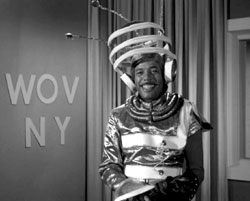 We continue to see bits of the "story" between numbers, bits that are blessedly short. We're not forced to wait too long before WOV New York DJ Douglas "Jocko" Henderson "the Ace from outer space" appears to introduce the next act.
We continue to see bits of the "story" between numbers, bits that are blessedly short. We're not forced to wait too long before WOV New York DJ Douglas "Jocko" Henderson "the Ace from outer space" appears to introduce the next act.
Jocko did his Rocket Ship Show twice daily as teh first radio DJ to be heard in two major markets. He'd do the show in New York City, then rush to the train station to do the show on WDAS Philadelphia.
This guy is dressed like a lunatic space man, talks like a rapping hipster "I'm back on the scene with the record machine/ Saying goo bop da boo, a how do you do, daddy-o," snapping his fingers.
Black DJs weren't yet all that common in '57, so he was a pioneer in more than one way, & that ability to rhyme all his monologues extemporaneously made him truly the first New York rapper, serving also as the emcee at Harlem's Apollo Theater.
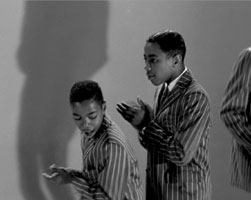 Jocko introduces Lewis Lymon & the Teenchords who sing "Your Last Chance." The group was a New York doo-wop group who began pkerforming while still in high school. Jocko introduces Lewis Lymon & the Teenchords who sing "Your Last Chance." The group was a New York doo-wop group who began pkerforming while still in high school.
They consisted of Ralph Vaughan first tenor, Rossilio Pocca second tenor, Lyndon Harold baritone and David Little bass, besides Lewis out front with the lead vocals.
There were many imitators of Frankie Lymon and the Teenagers, but none so close to the original as when Frankie's own brother headed up the Teenchords. Many of their upbeat doo-wop numbers sounded pretty much alike, often written for them (as was "Your Last Chance") by record producer Bobby Robinson.
Lewis was youngest at age 13 when this film was made. Second youngest was Lyndon at age fifteen. They had cut their first records November '56 for the Fury label and were a moderate hit in Philadelphia, New York, and Boston.
They got their big boost on a Friday night, January 3, 1957, on the stage of the Apollo Theater. But it was not smooth sailing. Later that year, a couple of the Teenchords got caught in a stolen car; their singles mostly failed to chart; and the group had broken up before the end of '58 without two full years together.
Jamboree is really the only chance to see Frankie's brother today, though Lewis continued to pursue a singing career for decades after. He got stuck in nostalgia routines like when he stood in for his dead brother in the 1970s with the "new" Teenagers, or when he reformed the Teenchords in the early '80s.
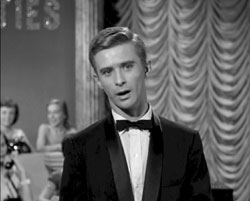 Pete Porter as a solo performer is introduced by Dick Clark to sing the love song "If Not For You" in a breathy Mel Torme bedroom style:
Pete Porter as a solo performer is introduced by Dick Clark to sing the love song "If Not For You" in a breathy Mel Torme bedroom style:
"I'd never know a happy day if not for you/ I still would go my lonely way if not for you/ The sweet delights of moonlit nights/ Were only wasted before/ The song the robin sings was just a song & nothing more..."
After this number, the telethon apparently ended while we were getting some additional lame story bits.
Pete's solo career without Honey has taken off, while her career has tanked. He's now in London with top billing above the The Four Coins, Slim Whitman, and a couple acts named on the poster but not actually seen, including Joan Regan & the Goofers.
I'd like to have seen The Goofers, headed by Jimmy Vincent formerly the drummer for the Louis Prima orchestra. And Joan Regan did such things as covers for British release of tunes known in the States from Teresa Brewer & Doris Day. She might've been fun to see in the film. But if they were ever really intended to be in the film, they didn't show up.
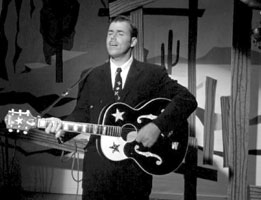 Pete introduces "My fellow countryman, Slim Whitman," who belts out a beautiful rendition of the country western tune "Unchain My Heart." Pete introduces "My fellow countryman, Slim Whitman," who belts out a beautiful rendition of the country western tune "Unchain My Heart."
Slim's not all that slim unless it means his slim grease-pencil mustache, but he's awfully cool even so. He's not a master of lipsync & even worse at pretending to be playing that left-hand guitar. None of the performances are really "live" of course, but he clearly needed to do his live as faking it wasn't his forte.
Slim wasn't really a westerner, but born & bred in Tampa, Florida. He became a star of radio's Louisiana Hayride, & by the time he was in Jamboree he was a star of the Grand Old Opry.
He had several charting hits but by the 1960s his sales were fading, & whatever crossover appeal he might have had was over. By 1974 he no longer had a recording contract, but in 1979 he became the first "Remember me? I'm so-and-so!" television pitchman selling his own greatest hits. All My Best is to this day the all-time bestselling infomercial-driven album.
He had the ability to blend country yodling with sophisticated crooning, & it's too bad he doesn't get to yodle in "Unchain My Heart."
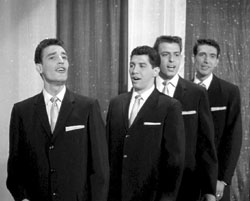 "Another great acts from the states" says Pete Porter, introducing the horrible Four Coins singing" "A broken promise, a broken heart/ You told me you loved me, & we'd never part...."
"Another great acts from the states" says Pete Porter, introducing the horrible Four Coins singing" "A broken promise, a broken heart/ You told me you loved me, & we'd never part...."
It's that collegiate style of harmony group that is always the totally opposite of hip, their sound interchangeable with that of The Four Freshman. But if you go for that sort of thing, the Four Coins are as good as the type gets.
They formed their group in 1952 in Canonsburg, Pennsylvania. They are George Mantalis, James Gregorakis, George Mahramas, and Michael Mahramous. They started out as a horn quartet with the Bobby Vinton Orchestra, but by the end of their first year together had taken up harmony singing, and left Vinton's orchestra to establish their own mark as the Four Coins.
It took a few years to score a hit record, "(Your Kisses Take Me) To Shangri-la" being really quite good, and they should've sung that instead of the bland "A Broken Promise for Jamboree. One of the "points" of Jamboree seemed to be to promote new singles rather than just the hits.
With changes of personel the Four Coins managed more or less to stay together until 1970, with never a second big hit though if you take the whole top 100 they charted a bit from 1955 to 1959. They were last seen singing "Shangri-la" to raise money for public television, along with all sorts of cool old coots.
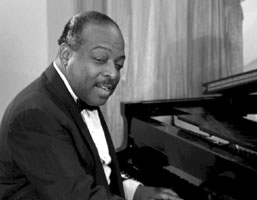 The next excuse to sew together a couple musical short-shorts brings us to a Grand Ballroom supper club, where the estranged Honey & Pete will have their first shot of patching things up.
The next excuse to sew together a couple musical short-shorts brings us to a Grand Ballroom supper club, where the estranged Honey & Pete will have their first shot of patching things up.
Some sweeps of the camera & judicious jump-cutting takes us to one of the finest mini-films spliced into this film, Count Basie & His Orchestra performing one of Basie's best-known numbers, "One O'Clock Jump."
Some filmographies & soundtrack listings, albums, & reference books have somehow alleged this number is called "Jamboree" as if written for the film.
The '50s hadn't been an easy time for big bands, & Basie had begun to perform with a top-flight combo to cut back on costs. Here, though, we see the entire orchestra, & nice to know producers of youth films realized the best of the best big bands still could & should be pitched to young audiences. Certainly all these years later, Basie's scenes are the ones with timeless authority.
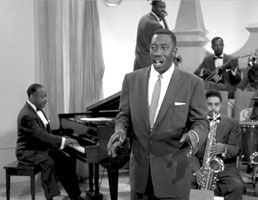 We see a lot of dancers on the club floor, & Basie's orchestra is better integrated into the film than any other act. We see a lot of dancers on the club floor, & Basie's orchestra is better integrated into the film than any other act.
As the film progresses we'll be given to understand there's a multi-artist concert going on, Basie the first of several in the evening's line-up.
But the other acts will very obviously have been filmed on a completely different soundstage without even a token attempt to make them look like they're in that dinner club. We get nice close-up portraits of Marshall Royal on alto sax, Freddie Green on guitar & drummer Sonny Payne.
Most of the filmed acts get only one song each, but Count Basie gets two. Joe Williams, Count Basie's vocalist beginning in 1954, is introduced to perform the amusing jump-blues lyrics for "I Don't Like You Any More" making it sound more like a Broadway show tune than blues.
Often billed as Big Joe Williams, for once "Big" doesn't mean overweight, but a big buff dude with the look of a boxer. Handsome guy.
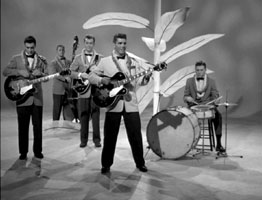 Buddy Knox and his band's performance of his own dubious composition "Hula Love" is supposed to be in the same dinner club, though obviously they're a sound stage in some other location.
Buddy Knox and his band's performance of his own dubious composition "Hula Love" is supposed to be in the same dinner club, though obviously they're a sound stage in some other location.
A fake palm tree has been placed on the stage with the band, so we can prepare ourselves for a South Seas number.
With guitars & leg-wobbling youthfulness, Buddy & his band give a visual look of Elvis hipness, but the Hawaiian song is pretty cheezy & seems like something more suited to 1940s novelty acts. Even so, he gives the goofy number as much vim as anyone could.
Standing to the far left with his guitar is Jimmy Bowen, who'll be next up with his own lead moment. Their band gets no cast credit, but they have rather faggotty name, the Rhythm Orchids. The Rhythm Orchids with Jimmy Bowen & Buddy Knox, in their usual stage act, increased their faggotiness by wearing lavender suits.
Now I dunno if Buddy, a father of five, reall was gay, but he did later live with concert promoter & folk-rocker Les Vogt. I don't really think there was ever a time you could get dressed up in lavender, call yourself an Orchid, & be entirely straight. The correct question would be, were Jimmy Bowen & the rest of the Orchids just dense, or were they all Brokeback mountaineers?
The line in "Hula Love" apart from "sweet jungle love" that goes best with the image is "On the isle of Filililla out Hawaii way/ A hula maiden gay strolled by a moonlit bay." There's no island of Filallia; it seems to play off a word for an act that requires the pants first to be unzipped.
Knox was a good Texas rockabilly singer & composer. "Hula Love" based on an old song from 1911, "Hula Hula Love," doesn't capture the best of his capacity. It's too bad a rare chance to see him performing has to be his dippy hula tune, when that same year he had big hit, with purest rockabilly perfection, "Party Doll," which the Rock & Roll Hall of Fame included in the list of 500 songs that shaped rock & roll.
The whole of Jamboree kind of pointedly avoids a "just the hits" format, so we get "Hula Love" instead of "Party Doll." But "Hula Love" was inexplicably a hit, probably due to the film, reaching #9 on the pop chart.
In 1999 Buddy died in my city of Bremerton, Washington, of lung cancer -- having been a heavy smoker his whole life.
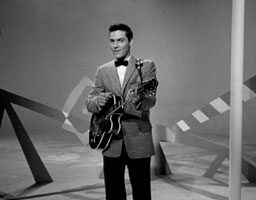 More of the minor plot is provided by the actors' portion of the film then it's back to the meat of the thing, the music.
More of the minor plot is provided by the actors' portion of the film then it's back to the meat of the thing, the music.
Still pretending to be in the supper club, but on the sound stage set with the same set designer as provided some decorative imagery for Buddy Knox, Andy Martin, & Charlie Gracie, we get lightweight rocker Jimmy Bowen singing "Cross Over."
With lyrics that begin "Dum yoddy yoddy yoddy/ Dum yoddy yoddy yoddy, bum bum bum/" we're certainly not entering the territory of great roots-rock. But it's interesting to see once again how so many of the minor rockers by 1957 had to be holding a guitar, as do several of the youth acts filmed for Jamboree. Jimmy was an excellent on stand-up bass, which he unfortunately does not play in Jamboree.
Lyrics like "Cross over baby and walk with me, just walk with me" sound a little gay. I have no reason to believe Jimmy & Buddy Knox of the Rhythm Orchids were gay, but strange to think they never realized their lyrics, & their orchid costumes, looked it.
Jimmy step-dances back & fourth between the set decorations looking like a total maroon. But I enjoyed his performance & his song song as period-piece corn-rock.
He did have a real hit that year, "I'm Stickin' With You," but following a pattern for the film, it promotes something new, not the established hit. Jimmy had co-written the number with Buddy Knox.
"I'm Stickin' With You" was billed as by Jimmy Bowen & the Orchids, while the flipside was Buddy Knox singing "Party Doll" billed as by Buddy Knox & the Orchids. It's a good guess that the band supporting Jimmy on "Cross Over" & Buddy on "Hula Love" are the Rythm Orchids, but they didn't get a cast credit.
Jimmy Bowen soon gave up singing in favor of behind-the-scenes production, working with Frank Sinatra & other Rat packers. By the 1970s he had became an influential executive in the country-western recording industry, a powerful figure in Nashville.
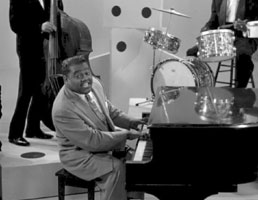 A high point of the film is the mini-film with the justly legendary Fats Domino, the epitome of the New Orleans sound.
A high point of the film is the mini-film with the justly legendary Fats Domino, the epitome of the New Orleans sound.
Here again the supper club is spliced in but then we go to a sound stage elsewhere, with giant dominos worked into the set design.
Fats sings very, very beautifully "Wait & See," which is something of a sound-alike for his enormous hit "Ain't it a Shame."
He's backed by a combo, including two tenor saxophonists. We're not hearing who we're seeing, though, & one of saxes on the soundtrack is white guy Dave Pell & an unknown studio musician, not Fats' usual lead saxophonist Herbert Hardesty who is heard on the official record release. The guitarist heard on the soundtrack is Barney Kessel.
The sax was the most important instrument for early rock 'n' roll & we can only regret that the guitar so utterly displaced it. Has a fat man ever been more beautiful? He's mesmerizing on the screen for his sharp look, his baring at the piano, & of course that New Orleans voice so powerful for the days of the birth of rock & roll.
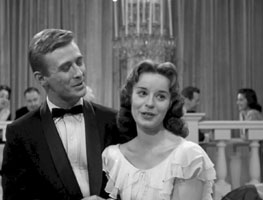 Meanwhile behind the scenes, Pete & Honey are getting back together, just in time to be part of the floor show at the supper club.
Meanwhile behind the scenes, Pete & Honey are getting back together, just in time to be part of the floor show at the supper club.
They perform "Twenty-four Hours a Day," a bouncy fun nurdy song that goes "Tell me that you love me the way that I love you/ Twenty-four hours a day/ Tell me that you want me the way that I want you/ Twenty-four horus a day..."
Even Connie Francis dubbing it couldn't save it altogether, but it's not too grating & has vaudevillian feeling that's actually entertaining.
This number ends the show, though really we may regard Fats Domino as providing the climax. Almost as the last image of the film, the annoying & cretinish managers run out in front of the camera to convey the likelihood that they are getting back together again, so who knows, when Honey & Pete get married, perhaps these crusty cretins will get re-married alongside them.
A worthwhile film, with more music packed into it than even most concert films that don't attempt a story with it. It's a balanced mix of forgotten entertainers who nevertheless provide a glimpse into '50s pop, & giants still admired & listened to.
copyright © by Paghat the Ratgirl
|
